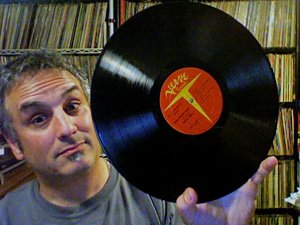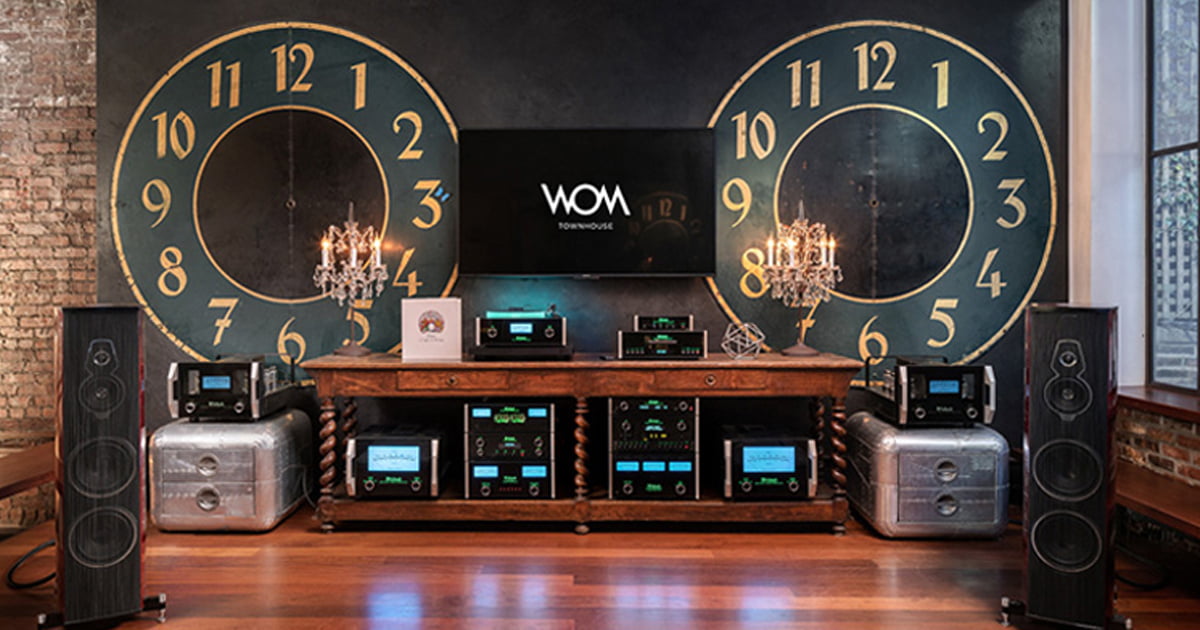It’s the time of year for saving money!
Some forty years ago, the renowned singer / entertainer Tony Bennett joined forces with one of the most highly regarded of jazz pianists, Bill Evans, for their first of two duet albums. At the time these release may have surprised some people. Those in-the-know recognized that Bennett was every bit the artistic equal to Evans’ hip jazz lineage. However, for mainstream pop fans — or jazz enthusiasts who hadn’t considered Bennett as more than the guy who made his name singing “I Left My Heart In San Francisco” — the collaborations (1975’s The Tony Bennett / Bill Evans Album, and 1977’s Together Again). may have raise a few eyebrows
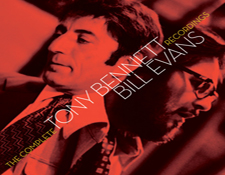 The thing that is immediately apparent in listening to these recordings with fresh ears is the sense of equal parity between the musicians. So many times on vocal music-driven recordings, the other instruments are presented as mere background “accompaniment” to the voice. This one is different. The two performers are clearly joined at the hip on this music and coming at it all from the same musical direction. The level of communication and timing between the two is quite astounding, with Evans anticipating Bennett’s every note, not only supporting but accentuating.
The thing that is immediately apparent in listening to these recordings with fresh ears is the sense of equal parity between the musicians. So many times on vocal music-driven recordings, the other instruments are presented as mere background “accompaniment” to the voice. This one is different. The two performers are clearly joined at the hip on this music and coming at it all from the same musical direction. The level of communication and timing between the two is quite astounding, with Evans anticipating Bennett’s every note, not only supporting but accentuating.
It is a give-and-take sort of partnership that rarely happens in a studio setting and is indeed that special secret sauce something that sets apart the best performances. Apparently Bennett and Evans worked out the arrangements fairly spontaneously, and then would pick the takes to be used on the records. Bennett has even explained that the pair didn’t even discuss song choices before the recording session. They would agree on a tune, find a good key and then together the two would work out how they would perform it.
That fresh approach comes across in these recordings, as does the mutual respect for one another. It is also very apparent that both artists very much love the music. It all there in the grooves (and bits and bytes if you are listening digitally!). The song that I feel most embodies this essence is the lovely Jules Styne tune “Make Someone Happy” (from the musical Do Re Mi). Just wonderful following the give and take between the musicians…
Over the years there have been numerous reissues and compilations, some with bonus tracks and the like. In honor the 40th Anniversary of these sessions, the folks at Concord Music Group (current owners of the Fantasy Records label) have put together a tasty four LP box set — called simply The Complete Tony Bennett / Bill Evans Recordings — pulling together all of the available tracks. The original albums are presented in their original running order and the third and fourth discs present a plethora of (mostly) alternate takes. From what I’ve been able to glean from the Internet, this material had come out on CD several years ago, but as far as I know this is the first time the set has been put out on vinyl. If you are familiar with the originals, it is fascinating to listen to the two LPs of alternate tracks to listen for the differences in phrasing and approach, and what led them to decide which were to be master takes for the final releases.
Now, I suspect that some of you may be wondering why a reissued / remastered type set like this might be warranted or needed? Beyond the 40th anniversary ….and beyond the fact that Mr. Bennett is once again in the limelight with his acclaimed collaboration with Lady Gaga … the reality is that the original albums were manufactured during a less than great time for the vinyl world.
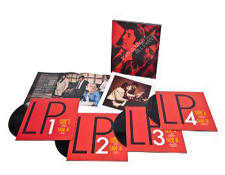 Amidst the many events of the mid-1970s, the Middle East oil crisis was an ongoing event that would take its toll on many a record release for several years — oil being a key ingredient in the creation of vinyl records. I certainly have no facts here and am not pointing fingers, but some entities were rumored to have used recycled vinyl or cut corners other ways to stretch the available resources. On top of this, Fantasy Records of the mid-late 70s was known for its rather flimsy vinyl pressings, many appearing as thin as the oft-loathed RCA Dynaflex formulation (I have some Fantasy issues from this period that are arguably thinner than Dynaflex!).
Amidst the many events of the mid-1970s, the Middle East oil crisis was an ongoing event that would take its toll on many a record release for several years — oil being a key ingredient in the creation of vinyl records. I certainly have no facts here and am not pointing fingers, but some entities were rumored to have used recycled vinyl or cut corners other ways to stretch the available resources. On top of this, Fantasy Records of the mid-late 70s was known for its rather flimsy vinyl pressings, many appearing as thin as the oft-loathed RCA Dynaflex formulation (I have some Fantasy issues from this period that are arguably thinner than Dynaflex!).
One major side-effect of these shortcuts resulted in noisy pressings… I have had two copies of the Fantasy album over the years (including my current one which I’m not real happy with) that I have found to be fairly noisy.
The other thing I found kind of curious is that by the mid-70s Mr. Bennett had ended his relations with Columbia Records and eventually started his own label, Improv Records. Usually artists start their own labels to keep their careers going when a major label has lost interest (ie. albums stop selling) or to maintain artistic controls. I suspect both were factors in Mr. Bennett’s case. Thankfully, as far as I know, he never was pushed to make a disco record (but apparently, according to the Wiki, he was coerced by his label to make some pop recordings in 1970 that he didn’t like much.
Anyhow, even after putting out an album as artistically wonderful as the first 1975 collaboration with Bill Evans, by the time of the 1977 release, Fantasy Records did not release the successor, for whatever reason. Instead it Bennett’s own Improv label put it out (distributed by Audiofidelity, a budget label as I remember, with audiophile roots if I’m not mistaken, back in the 1950s).
I’ll be blunt: Together Again was kind of a cheesy looking package, with weak design elements and such. The duo had recorded an arguably better follow up album there, but their label dropped the ball cutting corners with a cheap looking cover and only an incrementally better sounding pressing than the Fantasy release. Apparently, the album’s distribution wasn’t so good either…
This music deserved better treatment.
]]>The Complete Tony Bennett / Bill Evans Recordings is a step in the right direction…
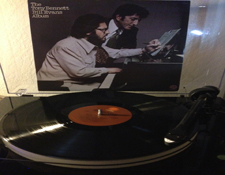 So how does the set sound? Overall, quite nice! Pressed on dark, thick, 180-gram vinyl, the pressings are well centered and for the most part dead quiet — along the way, I heard one or two of those annoying split-second pressing anomaly type sounds (“pffffft”) but it was nothing that would make me rush to the store to return the set. Compared to the original LPs, the albums fare well with a pleasant consistency of sound across all four discs.
So how does the set sound? Overall, quite nice! Pressed on dark, thick, 180-gram vinyl, the pressings are well centered and for the most part dead quiet — along the way, I heard one or two of those annoying split-second pressing anomaly type sounds (“pffffft”) but it was nothing that would make me rush to the store to return the set. Compared to the original LPs, the albums fare well with a pleasant consistency of sound across all four discs.
Again, my originals are somewhat on the noisy side so — at least, for me — solving that part of the vinyl equation is a big improvement. As far as whether this was mastered directly from the original analog tapes or from a digital source, I do not know. That information is not on the album liner notes and I was not able to find any other details on the Internet nor from the label (which sent me the album and CD sets to review, full disclosure). I did find an image of the original 2009 two-CD issue of this album on the internet which states on the back cover “24-bit remastering by George Horn and Seth Presant.” So, we can surmise that IF a digital source was used for the creation this new four LP boxed set, it was likely from a 24-bit source. Stands to reason…
And of course, somewhere at the start of the food chain, the original tape was inevitably analog since digital recording didn’t yet exist in the mid-1970s.
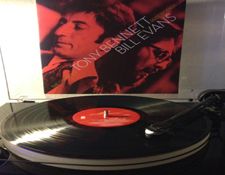 Comparing these new LPs to the new CDs, the LP sounds close and maybe a bit better. I think I’m hearing a bit more air around the music and perhaps some analog tape hiss in there that is not apparent on the CD. The recordings play out perhaps a little warmer, benefitting nicely from my Bellari tube pre amp. I’m not hearing any common angular artifacts that can come from a poor digital transfer, so even when Tony pushes and goes for the big notes the music isn’t getting harsh to my ears.
Comparing these new LPs to the new CDs, the LP sounds close and maybe a bit better. I think I’m hearing a bit more air around the music and perhaps some analog tape hiss in there that is not apparent on the CD. The recordings play out perhaps a little warmer, benefitting nicely from my Bellari tube pre amp. I’m not hearing any common angular artifacts that can come from a poor digital transfer, so even when Tony pushes and goes for the big notes the music isn’t getting harsh to my ears.
If anything, these new LP and CD sets sound a tad shinier than the originals. Yes, shiny. I mean that in a good way. They sound not exactly “brighter,” but feel somehow a tad cleaner, like fine furniture that has been gently polished.
It is what it is, as “they” say….
Certainly, the packaging is way way way better than the treatment these albums got back in the day, with neat individual cardboard sleeves for each disc (housed in a static-free type plastic inner sleeve). The artwork is clever, using the original photo session proof sheets — an array printed off the photo negatives, for those of you who never saw a proof sheet or don’t know what a photo negative is — with certain images marked in the traditional orange-red wax pencil used back in the day. That orange-red color provides much of the palate for the whole box design.
For those of you disappointed that it doesn’t reproduce the exact original artwork, fear not: the set comes with a suitable-for-framing 12″ x 12″ photograph of the two musicians from the cover of the first album. There is also a real nice full color booklet featuring rare images and extensive liner notes by Will Friedwald (co-author of Tony Bennett’s autobiography, The Good Life). There is even a photo of the original 8-track cartridge version of the album!
So there you have it. If you want all the Bennett / Evans recordings in one space and on vinyl, it is available now. If you already have clean pressings you like and don’t feel the need to get the alternate takes, well then this may not be your cuppa tea. But if you love Tony’s voice and Bill’s playing, and have never had a decent listenable copy on vinyl, then this new boxed set may be your ride.
Maybe someday we’ll get a nice 5.1 surround sound remix off the master multitrack tapes that — like a fly-on-the-wall — would put you in the room with Bill and Tony…
That would be a treat!
Until then…
